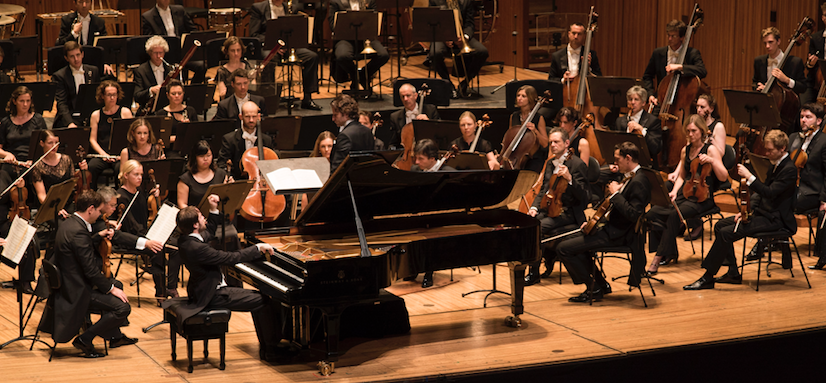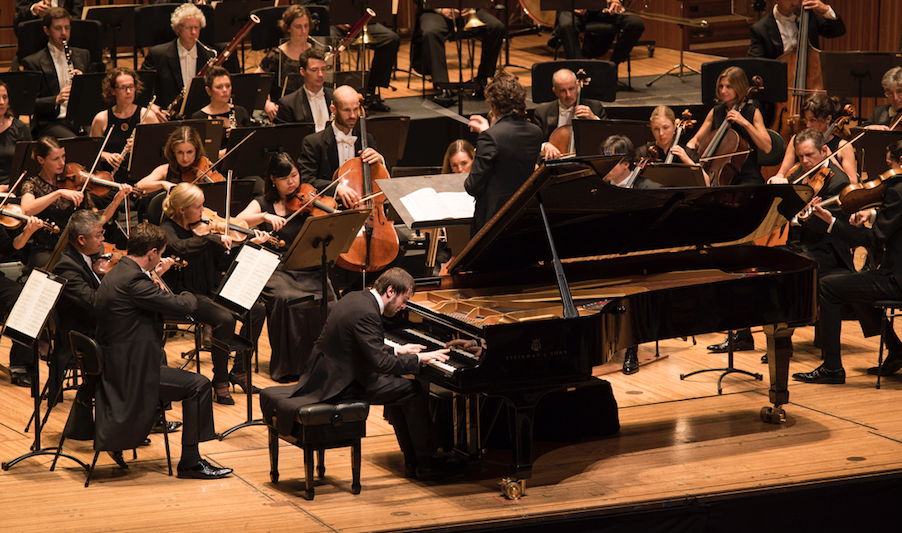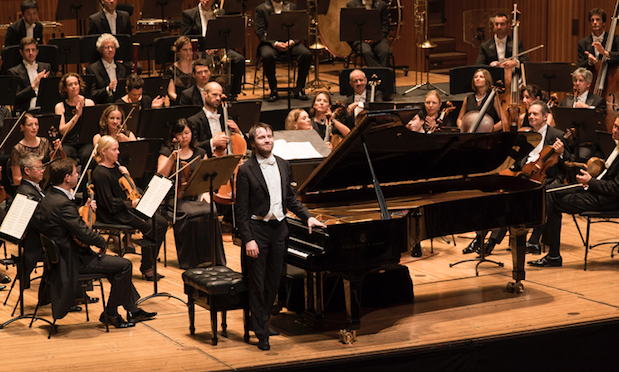Good things come in threes, they say. Well, make that four in the case of this smartly coherent programme of a trio of young Russian composers and the anticipated debut of 25-year-old piano wunderkind Daniil Trifonov. Actually, make that five, as the Sydney Symphony debut of the Spanish conductor Gustavo Gimeno was equally impressive, pulling together three works that, although separated by only a few years, reveal three wildly different musical, political and emotional personalities.
 Daniil Trifonov & the SSO. Photos © Christie Brewster
Daniil Trifonov & the SSO. Photos © Christie Brewster
Prokofiev first, and the cocky young Turk’s Classical Symphony, perhaps the most charming initial essay in the form ever penned. Gimeno is an Abbado protégé, and displays some of that master’s understated refinement. A naturally elegant conductor, he brings out the natural elegance in Prokofiev. He was also Principal Percussionist with the Concertgebouw for several years, and a crisp, clean sense of rhythmic exactitude shone through in all three works on the programme.
He proved adept from the start at bringing out the inner details in Prokofiev’s delicate, economical writing, particularly the scrunchy bits that defy the symphony’s ‘Classical’ pretensions. The opening Allegro was all grace, though the acoustic swallowed some details in the fortissimos. Woodwind were exceptional here, and particularly bassoons (by some strange coincidence an instrument favoured by the composers in all three works on the bill). The Larghetto – more reflective of the Beethoven of the Sixth and Seventh Symphonies perhaps than Haydn – featured exquisite, lyrical playing from the first violins. The dynamic finale, with its debt to Tchaikovsky, was a thrilling ride taken at breakneck speed.
The cheeky Prokofiev’s homage to Classicism couldn’t be further removed from the hypersensitive and patrician Rachmaninov’s First Piano Concerto, a work of arch-Romanticism if ever there was one. Written at the age of 19, but substantially revised in 1917 (the same year as the Prokofiev), it requires a big technique and a steely passion to bring it off, and in Daniil Trifonov that was exactly what it got.

The young Russian is possessed of an extraordinary energy and attack, allied with phenomenal manual dexterity and a pinpoint accuracy, allowing him to pitch a positive pianistic fusillade up against Rachmaninov’s opening orchestral sallies. An angular figure, lean and intense, Trifonov alternately hunches low over the keys, as if daring them to escape his beady eye, then reclines, but never quite to the vertical, his body swaying gently to aid his more lyrical gestures.
There was more than a touch of angry young man in the opening Vivace, Trifonov’s weighty tone riding the orchestra with deceptive ease. The parade of themes and their development sections were mined for every ounce of contrast, the sheer fury of his cadenza, at times, was breathtaking. This was a highly individual reading, clipped and breathless, reminding one of the young Horowitz, or even perhaps as one would imagine the young Liszt.
Saving his poetry for the Andante, Trifonov demonstrated a great sensitivity of touch and a sure feel for the music’s ebb and flow. In his hands, the opening theme was hesitant, as if feeling its way up and into the moonlight, before the soloist encouraged it to blossom with a heady musical perfume. With fine support from horn and bassoon, the balance between piano and orchestra was, again, outstanding.
If the first two movements were alternately tense and lyrical, the finale brought a new playfulness to the fore. With carefully weighed pauses for the more meditative sections, Trifonov’s rubato was always beautifully judged and never over-egged. Scurrying towards the final climax, his fine-boned fingers became a blur as they whirled across the ivories, before orchestra and soloist came together for Rachmaninov’s keyboard crushing finish. This was peerless playing from a rare talent in perfect repertoire and Australian orchestras should be queuing up to have him back.

More contrast in the second half, and Shostakovich’s First Symphony, a graduation work that displays a level of wit – or more specifically irony – that he wouldn’t match until the more overt ambiguities of the Ninth. At the premiere, the Russian critics loved it, but they should’ve seen the writing on the wall as Shostakovich early on showed an aptitude for musical deception and the ‘is it or isn’t it’ humour of black comedy. As it was, the infamous “Muddle instead of music” was still nine years away.
Gimeno gave the fledgling symphony a precise, sparkling reading, matching Shostakovich’s almost clinical demonstration of what an orchestra can do. From the opening trumpet solo – trumpets were superb all evening – Gimeno guided the SSO carefully through each contrapuntal twist and turn. The multiplicity of quirky woodwind solos were neatly finessed, and again the first violins deserve mention for their disciplined work in the upper register (Andrew Haveron’s solo contributions especially).
More detailed playing characterised the cartoonish chase of the Scherzo (at times it was laugh out loud) with distinguished solos on piano and winds, set off against the catchy earworm of the languorous second subject. With eloquent contributions from Diana Doherty on oboe and Umberto Clerici on cello, the melancholic third movement was a welcome oasis of calm before the combined forces groped their way through Shostakovich’s tricky, rather anticlimactic finale with its numerous twists and turns and Hollywood ending.
This was a fascinating programme, full of contrasts, and a perfect demonstration of the diversity of musical thought that would see composers pursue wildly different paths inside and out of Russia in the later Soviet era. But perhaps the night’s real revolutionary was Trifonov, a prodigious artist already challenging the status quo. His recital is Monday night – storm the Winter Palace for a ticket.
Young Russians is repeated on March 3 and 4. Daniil Trifonov is in recital at City Recital Hall March 6, with the West Australian Symphony Orchestra at Perth Concert Hall March 10 – 11, in recital at Melbourne Recital Centre March 14, with the Melbourne Symphony Orchestra at Arts Centre Melbourne March 17 – 20.











Comments
Log in to join the conversation.